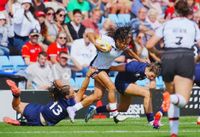The Women’s Rugby World Cup Pool B showdown at Sandy Park in Exeter on September 6, 2025, saw Canada stamp their authority with a 40-19 victory over Scotland, clinching top spot in the group and maintaining their unbeaten run. The stakes were high: both teams had already punched their tickets to the quarterfinals after dispatching Fiji and Wales, but this clash would decide who avoided a daunting last-eight encounter with tournament favorites England.
From the opening whistle, the match had all the hallmarks of a classic. Scotland, led onto the pitch by Sarah Bonar on her 50th cap and captained by the ever-reliable Rachel Malcolm, looked determined to challenge the world’s second-ranked side. The early exchanges were fiercely contested, with Lisa Thomson setting the tone for Scotland by counterattacking off a Canadian clearance. Yet it was Canada who struck first, as prop McKinley Hunt powered over the line after 11 minutes, with Sophie de Goede calmly slotting the conversion to make it 7-0.
Scotland, undeterred, responded with grit. They earned three consecutive penalties deep in Canadian territory, repeatedly opting for the lineout rather than easy points. Persistence paid off when, after a series of phases and a deft pass from Chloe Rollie, Rhona Lloyd finished in the corner for Scotland’s opening try at the 23-minute mark. The conversion attempt from the touchline sailed wide, but Scotland had announced themselves, closing the gap to 7-5.
The Canadians, renowned for their relentless forward play, soon reasserted themselves. A crucial turning point came on the half-hour when Scotland’s Evie Gallagher was penalized for being off her feet at the breakdown on the try line and shown a yellow card. With Scotland down to seven forwards, Canada’s scrum proved irresistible, earning a penalty try after a powerful shove. The scoreboard read 14-5, and the momentum had swung.
Canada’s pack continued to dominate. Just minutes later, Emily Tuttosi, who would go on to be named Mastercard player of the match, crashed over for Canada’s third try. The conversion was missed, but the hosts entered halftime with a commanding 19-5 lead, having scored three tries to Scotland’s one. Yet, the Scottish defense, buoyed by desperate tackles from Leia Brebner-Holden and others, had kept the game within reach.
The second half began with renewed Scottish energy. Fran McGhie, a standout winger throughout the tournament, sparked a line break that eventually led to a penalty. Although Helen Nelson’s kick failed to find touch, Scotland regained possession, and Gallagher, fresh from the sin-bin, sliced through the Canadian defense for a well-deserved try. Nelson’s conversion narrowed the deficit to 19-12, and for a fleeting moment, the Scots were within touching distance.
But Canada, as they have all tournament, found another gear. A penalty for side entry allowed them to set up camp on the Scottish 5-meter line, and Tuttosi again capitalized, scoring her second try of the afternoon. De Goede’s conversion pushed the lead to 26-12. The Canadian forwards, particularly the front row, continued to dictate play, with replacement prop Brittany Kassil joining the try parade at the 65-minute mark after a powerful drive. With de Goede adding the extras, the score ballooned to 33-12.
Scotland, to their credit, never folded. They mounted a series of late attacks, with McGhie, Rollie, and Lloyd all making incisive breaks through a tiring Canadian defense. Under penalty advantage, McGhie took a slick pop pass from Caity Mattinson and dived over for her sixth try of the tournament—tying her with Canada’s Julia Schell for the competition lead. Nelson’s conversion brought the score to 33-19 with just five minutes remaining.
Yet, any hopes of a dramatic Scottish comeback were dashed when Canada responded immediately. A clever kick forced Scotland to scramble, and from the ensuing lineout, Olivia DeMerchant crashed over from close range. Alex Tessier’s conversion rounded out the scoring at 40-19. Tessier fittingly booted the ball into the stands as the final whistle sounded, sealing a comprehensive win for the Canadians in front of a lively crowd of 15,600.
Canada’s six tries came almost exclusively from their forwards: two from Tuttosi, and one each from Hunt, Kassil, and DeMerchant, plus the penalty try. It was a testament to their physical dominance and tactical discipline up front. “We always knew Scotland would bring a fight, but our pack took it personally,” said Tuttosi, who was deservedly named player of the match after her two-try performance.
For Scotland, there were positives despite the loss. Tries from Lloyd, Gallagher, and McGhie highlighted their attacking potential, and the side showed they could challenge some of the world’s best. Bonar’s milestone 50th cap added an emotional note, and the leadership of Malcolm and the energy of Gallagher were evident throughout. Coach Bryan Easson will take heart from his team’s resilience and ability to exploit opportunities, especially as they look ahead to a likely quarterfinal clash with hosts England.
Both teams had already secured passage to the knockout stages with earlier wins over Fiji and Wales, but the outcome of this contest shaped their quarterfinal destinies. Canada, by topping Pool B, will avoid an immediate confrontation with England and instead face the runner-up from Pool A—either Australia or the United States, depending on later results. Scotland, meanwhile, must prepare for a daunting encounter with the tournament favorites, but their display against Canada will give them confidence that they can compete at the highest level.
The match was the first in a double-header at Sandy Park, with Fiji and Wales facing off later that afternoon. Elsewhere, Pool A action saw the United States take on Samoa and England meet Australia, with quarterfinal places and permutations still to be settled as the World Cup drama continued to unfold.
As the dust settles on a bruising encounter, Canada’s blend of power, composure, and clinical finishing stands out. With the knockout stages looming, they look every bit the title contenders their world ranking suggests. For Scotland, the journey is far from over. Their spirit and flashes of brilliance hint at more fireworks to come as the tournament reaches its business end.






